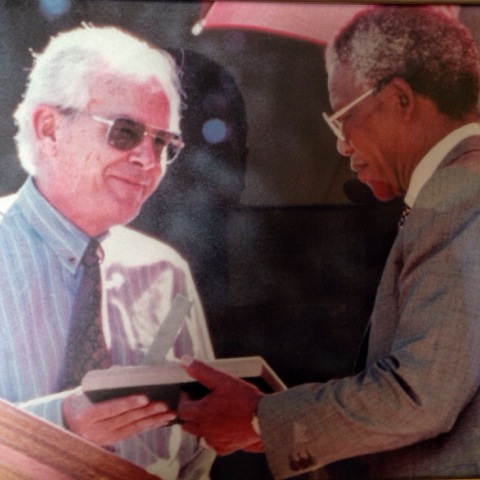A tribute to Bishop David Russell - Grahamstown
 Wednesday, August 20, 2014 at 8:31AM
Wednesday, August 20, 2014 at 8:31AM  A good friend of mine, Fr Larry Kaufmann introduced me to Bishop David Russell in Grahamstown many years ago. I had the joy of visiting his residence, and praying in his chapel, in Grahamstown. It was at his home that I first saw the film Babette's feast - a profound moment that changed my understanding of hospitality, grace and the sacraments.
A good friend of mine, Fr Larry Kaufmann introduced me to Bishop David Russell in Grahamstown many years ago. I had the joy of visiting his residence, and praying in his chapel, in Grahamstown. It was at his home that I first saw the film Babette's feast - a profound moment that changed my understanding of hospitality, grace and the sacraments.
Bishop Russell was a great inspiration to many young clergy in South Africa, and across the world. He was deeply committed to the Gospel of Christ and God's Kingdom of justice, mercy, and grace. His life and ministry showed many of us what it meant to be welcoming, and to be welcomed, into loving fellowship with God in Christ and one another.
Bishop Russell passed away this week. I thank God for his life and ministry. He was a Public Theologian par excellance!
Here is a tribute to David Russell written by my friend Archbishop Thabo Makgoba:
"With David Russell's death, an era passes for the Church and its
prophetic and courageous ministry, especially to the poorest of the poor."From the earliest days of his ministry as a priest, he was radical in
his identification with the poor and oppressed. Steve Biko, with whom he
worked closely, called him 'a friend, an equal... a comrade.'"In the Eastern Cape in the 1970s, he played an important role in drawing
attention to the plight of people who were forcibly removed from their
homes under apartheid and dumped to starve in areas, such as Dimbaza,
where they had no hope of making a living."Later, as a chaplain to migrant workers in Cape Town, he campaigned
against the cruel removals, in the middle of winter, of families who
defied the pass laws and came to Crossroads to live with their husbands
and fathers."When the apartheid government sent in bulldozers to destroy their
shacks, he was willing to put his life on the line - one admirer recalled
on Facebook this week: 'Will never forget the image of DR lying,
spreadeagled, in front of a bulldozer in Crossroads.'"When the government imposed a banning order on him, he defied it,
breaking it in multiple ways to attend a meeting of the Church's
Provincial Synod and to motivate a resolution expressing the Church's
understanding of those who had resorted to armed struggle."After becoming Bishop of Grahamstown, he ordained the first woman priest
in Southern Africa and repeatedly challenged the Church on theological
grounds to reverse its opposition to blessing same-sex unions. He also
challenged the democratically-elected provincial government of the
Eastern Cape for its failures in areas such as health and education."As one who served as Bishop David's suffragan bishop in Grahamstown and
was mentored by him, I feel his loss keenly."Not only the Church but the nation - which honoured him for his service
with the Order of the Baobab in Silver - mourns this son of the soil."On behalf of my family, the Diocese of Cape Town, the Synod of Bishops
and the broader church, we send our condolences and prayers to his wife,
Dorothea and to his sons, Sipho and Thabo."May this pastor, prophet, theologian and fierce fighter against
injustice rest in peace until we meet again."








 This past week I had the privilege of doing the closing plenary address at the Stellenbosch University Winter School. The theme of the conference was hope.
The quote below sums up what I tried to say.
This past week I had the privilege of doing the closing plenary address at the Stellenbosch University Winter School. The theme of the conference was hope.
The quote below sums up what I tried to say.




